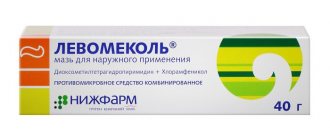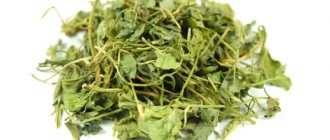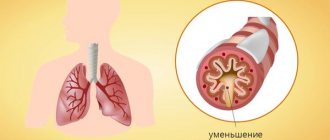Pills to stop lactation should not be taken without a doctor's prescription. These drugs can quickly stop milk production, but the woman will have to pay for this with her well-being. If, after taking such drugs, the mother feels pain in the chest or notices bleeding, she should urgently consult a doctor.
It is advisable to consult with a breastfeeding specialist about how to safely stop breastfeeding for a child before lactation stops. Next, you need to figure out which drugs to suppress milk production can and cannot be used, and what side effects you need to be prepared for.
What do you need to know before stopping lactation?
Today we can observe a trend towards a conscious approach to natural feeding of the baby. Many mothers try to maintain lactation and prolong it for the maximum period. And this is good news, since the beneficial properties of breast milk are difficult to overestimate.
However, there are situations when a mother is forced to stop breastfeeding for some reason. In addition to factors caused by circumstances, medical indications may also occur. For example, if you have osteoporosis, long-term breastfeeding is contraindicated. Often, doctors can detect an increased level of prolactin in a woman’s blood; in this case, breastfeeding is possible, but it is necessary to be observed by an endocrinologist.
This also applies to pituitary adenoma. If this neoplasm was detected after the birth of the child, then it makes sense to stop lactation to prevent its growth.
Endocrinologists believe that lactation should end with involution, having gone through all phases. It is difficult to talk about specific dates, since for each woman this process is individual. However, you still need to follow the recommendations of doctors and give the maximum of nutrients to your baby. For example, it is recommended to feed a child until at least 9 months to prevent the onset of type 1 diabetes.
Often, after giving birth, women do not begin breastfeeding, but they continue to produce milk. Then you need to stop lactation as quickly as possible so as not to harm your health. There are several methods and means that help stop milk production, the most popular are special medications.
Drug cessation of lactation
If the natural completion of lactation cannot be achieved, then you can resort to the medicinal method. However, it is important to understand that all pills to stop lactation have a wide range of contraindications and side effects, for which the mother needs to be prepared.
It is important to note that under no circumstances should a baby be put to the breast after a woman has taken medications to stop lactation. Naturally, a sharp change in the usual lifestyle can negatively affect both the mother’s well-being and the baby’s condition, so medicinal cessation of lactation should be started only in extreme cases.
Indications for medicinal cessation of milk production:
- late pregnancy termination;
- stillbirth;
- purulent mastitis;
- pathology on the mother’s side (oncology, tuberculosis, HIV);
- pathology on the part of the child (galactosemia and phenylketonuria).
Drugs to stop lactation should be taken only after a doctor's prescription. Despite the wide range of these medications, their main mechanism of action is the same - to reduce and suppress the production of prolactin. Therefore, the doctor must choose exactly the medicine that will best suit the woman, taking into account the individual characteristics of her body.
All pills to suppress lactation have a similar number of side effects that a woman should be prepared for.
These include:
- weakness and fatigue;
- nausea and vomiting;
- dizziness and headache;
- drowsiness.
These are the most “harmless” side effects that will disappear when lactation stops completely.
However, you need to prepare for more serious contraindications, such as:
- depression;
- hormonal dysfunction;
- disturbances in the functioning of the endocrine system;
- exacerbation of chronic diseases.
Often, it takes a lot of effort, time and money to remove side effects. Therefore, you need to think several times before giving up lactation with medication.

Pills to stop lactation, medications to burn out breast milk
Breastfeeding is beneficial not only for the baby, but also for the health of the mother. But sometimes it is necessary to stop breastfeeding before the natural weaning period occurs. In this case, many people use pills to stop lactation.
In this article we will look at: what are the pills for burning breast milk, and what do you need to know about them? Opinions of authoritative organizations on the use of Bromocriptine and Dostinex.
The principle of action of lactation tablets
Drugs to stop lactation are based on the action of slowing down the synthesis of prolactin and somatotropin.
According to the Wikipedia definition, prolactin is responsible for milk production, colostrum maturation and mature lactation. In addition, prolactin receptors are found in almost all organs of the human body: in the epithelial cells of the uterus, in the pancreas, in the lungs, kidneys and liver. This suggests that the importance of this hormone in the body is not limited only to milk production. And also, according to some data, prolactin is involved in the response of immune cells to inflammatory processes.
Synthesis of prolactin in the anterior lobe of the pituitary gland
Tablets to suppress lactation reduce the level of somatotropin - growth hormone. This hormone is responsible for such processes in the body as: protein synthesis, the predominance of muscle tissue over fat, and maintains the level of insulin in the blood. A person’s mental abilities, energy potential and immunity depend on the level of this hormone.
Taking hormonal drugs that reduce prolactin synthesis can negatively affect the functioning of all organs.
When is it justified to take drugs to suppress lactation?
Such gross interference with the body’s hormonal system can only be justified in emergency cases:
- development of mastitis and purulent mastitis in a nursing mother
- stillbirth
- late miscarriage
- HIV infection in mother
- malignant tumor
- herpetic rashes on nipples
- open form of tuberculosis
- pituitary adenoma
Treatment should occur only after examining the woman’s health condition. And under the strict supervision of a doctor.
Pharmacological cessation of lactation
To suppress lactation in modern medicine, drugs with the active ingredients bromocriptine and cabergoline are used.
Bromocriptine (sold under the brand names: Parlodel, Bromolactine, Krypton)
The drug slows down the production of prolactin. But it is effective only at the beginning of lactation when the level of this hormone is low. Already a few weeks after birth, prolactin levels settle at an average level, and bromocriptine becomes ineffective to reduce lactation. Frequent cases of resumption of lactation after completing a course of treatment confirm this.
The Pharmacological Committee of the Ministry of Health of the Russian Federation recommends the use of bromocriptine only in cases of mastitis and purulent mastitis due to a wide list of adverse reactions: nausea, vomiting, dizziness, convulsions, myocardial infarction, even death. The use of this drug is prohibited for diseases of the cardiovascular system, hypertension, and gastric ulcers.
Cabergoline (sold under the brand names: Dostinex, Agalatex, Bergolak)
The principle of action is similar to the previous drug. Although the side effects are not as pronounced as those of bromocriptine, their list is also impressive: decreased blood pressure, headaches, nausea, vomiting, constipation, psychomotor agitation, convulsions. This drug is contraindicated in women who have postpartum depression or similar conditions.
When using drugs to suppress lactation, engorgement of the mammary glands is possible. In such cases, it is necessary to express milk until the breasts are relieved. In some women, a few weeks after the end of treatment, lactation resumes. However, it is worth considering that it will no longer be possible to feed the child.
“You need to understand that against the backdrop of poor health from taking such drugs, the mother will also have to distract the child from the habit of sucking the breast.”
From 1980 to 1994, the US FDA Committee (food & drug academy) conducted research, which revealed that the active substance Bromocriptine and Cabergoline do not suppress lactation, but simply delay it. This is not comparable with the risk of possible adverse reactions. Since 1989, lactation pills have been banned in the United States.
The international breastfeeding support organization La Leche League (www.lli.org) also does not recommend the use of any medications to terminate breastfeeding.
Physiological completion of breastfeeding
According to WHO, physiological cessation of lactation is the most acceptable method of ending breastfeeding, even if this must be done as soon as possible.
Here's what it is:
- Wearing a tight bra that supports the breasts. This should not be confused with chest tightening.
- Expressing an overfilled breast until relieved, but not empty. Gradual reduction in the number of pumping sessions.
- In case of severe breast pain, prescribe painkillers.
Useful video about how breasts behave after breastfeeding ends:
“Breast milk contains a special enzyme that reduces the amount of milk if it does not leave the breast. That is, if you don’t latch on to the baby, and don’t express your breasts until the last drop, but only until you feel relieved, milk will stop producing on its own.”
The list of adverse reactions from drugs to stop lactation is extensive, but this is not even the worst thing. By deciding to use medications to stop breastfeeding, a nursing mother grossly interferes with the hormonal system of her body. Therefore, before taking pills to stop lactation without any particular reason, you should think very carefully and consult with your doctor.
vseposlerodov.ru
Review of drugs
Dostinex or Cabergoline
Cabergoline is a synthetic drug from the ergoline group. It can be found in pharmacies under the trade name Dostinex. This substance has a pronounced and long-lasting effect of reducing prolactin. Once in the body, Cabergoline blocks the secretion of prolactin, directly affecting special receptors. Even 3 hours after administration, a woman’s body experiences a significant decrease in the level of prolactin in the blood. At this level, the hormone can last from 7 to 28 days. The effect during postpartum lactation lasts about 3 weeks.
This drug has a number of contraindications, including renal or liver failure, postpartum psychosis, hypersensitivity to individual components of the drug, gastritis, ulcers, etc. Often a woman may not be aware of the presence of some disease (for example, gastritis). To prevent possible complications, she needs to consult a doctor before taking Dostinex.
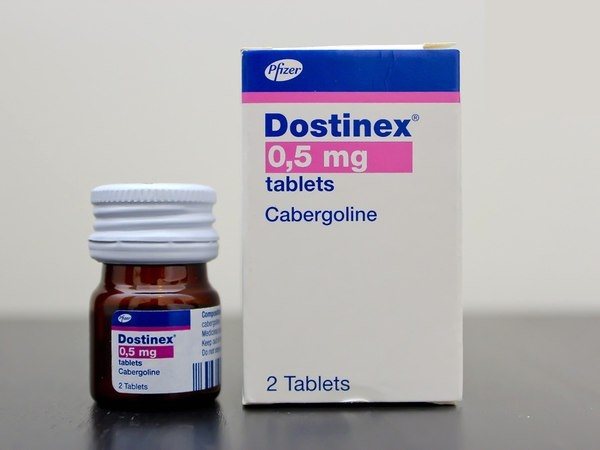
Bromocriptine
Bromocriptine is also often used today in the practice of Russian obstetricians. This medicine is based on ergot alkaloids. They are the ones who influence the production of prolactin. In Russia, Bromocriptine is recommended by a specialized committee of the Ministry of Health to reduce lactation if a woman has severe forms of septic mastitis. If, with such diseases, a woman does not take measures to interrupt milk production, there is a risk of pulmonary embolism, stroke, or even death.
It is important to note that this drug is prohibited for use in the United States due to the large number of side effects. After the introduction of Bromocriptine into the market, many patients came forward with complaints. Cases of death have also been recorded.
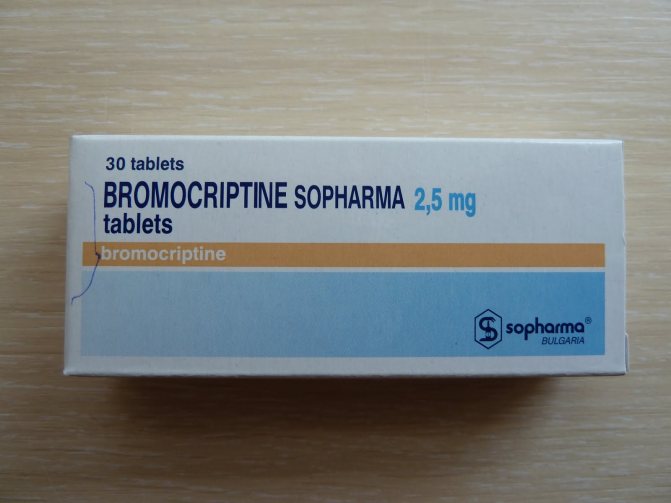
Stilboestrol and Estrogen
These 2 drugs are practically not used today to suppress milk production, but women should know the name of each of them so as not to fall for the bait of unqualified specialists or scammers.
Stilboestrol was used in the past, but due to the high risk of negative effects on the body, it is no longer prescribed. After a course of using this medicine, a woman’s breasts may swell again, accompanied by painful sensations, bleeding and thromboembolism may occur.
During pregnancy, Stilboestrol is contraindicated for use, as it can cause fetal development abnormalities.
Estrogen is a hormone that is used along with testosterone. It was stopped being prescribed after the same symptoms were discovered as after taking Stilboestrol. Levodopa is considered similar to estrogen. This is also an outdated drug that is very difficult for patients to tolerate.
When choosing a means to stop lactation, a woman should have at least a little insight into this issue. Taking medication solely because someone recommended it or because it is sold at a low price can end in disaster.

Medicines that stop lactation
Currently, there are a number of drugs that suppress milk production. These products are available in the form of tablets and intramuscular injections. They have a hormonal basis, affect the endocrine system and have side effects.
How to properly complete lactation with the help of medications? Only a doctor can recommend, prescribe such medications and help you make a choice. Consultation with a mammologist is also recommended. If a woman decides to interrupt lactation using pills, she should be prepared to feel unwell and experience undesirable consequences.
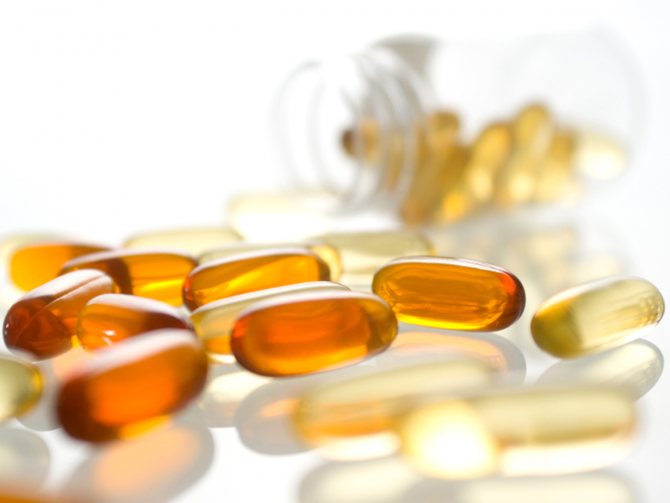
So, the most popular means:
- Parlodel is a drug that suppresses physiological lactation. Do not use for high blood pressure, stomach ulcers, or cardiovascular pathologies. It has a number of contraindications, including: vomiting, headaches, myocardial infarction, skin rashes, convulsions. An overdose can cause fainting, peptic ulcers, and confusion.
- Dostinex is an inhibitor of prolactin secretion. The active substances of the drug affect the pituitary gland and suppress hormone synthesis. Reduced levels of prolactin in the blood reduce milk production. The drug is not recommended for use in cases of arterial hypertension, cardiovascular disorders, liver failure, or mental disorders. Side effects of the drug: low blood pressure, abdominal pain, intestinal upset, drowsiness, lethargy, nosebleeds.
- Bromocretin. The drug is taken when they want to interrupt lactation; the effect is achieved with long-term use. Side effects include: nausea, vomiting, allergic skin rash, decreased visual acuity, myocardial infarction, stroke. The drug is contraindicated for psychoses, heart disease, liver failure, and stomach ulcers.
- Norkolut – recommended for stopping lactation. Not prescribed for acute liver and kidney diseases, thrombophlebitis, heart failure, migraine.
- Quinagolide is a long-acting modern drug that suppresses breast milk production and has fewer side effects.
- Bromcamphor is a sedative and non-hormonal drug. Gynecologists prescribe this medication to gradually stop lactation.
After taking even one tablet of the listed drugs, breastfeeding cannot be resumed. It is necessary to strictly adhere to the dosage of medications prescribed by the doctor. When lactation suddenly stops, lumps and other unpleasant sensations may form in the breasts. If your health deteriorates significantly, you should immediately seek medical help. Considering the undesirable consequences of drug cessation of lactation, this method should be used in exceptional cases.
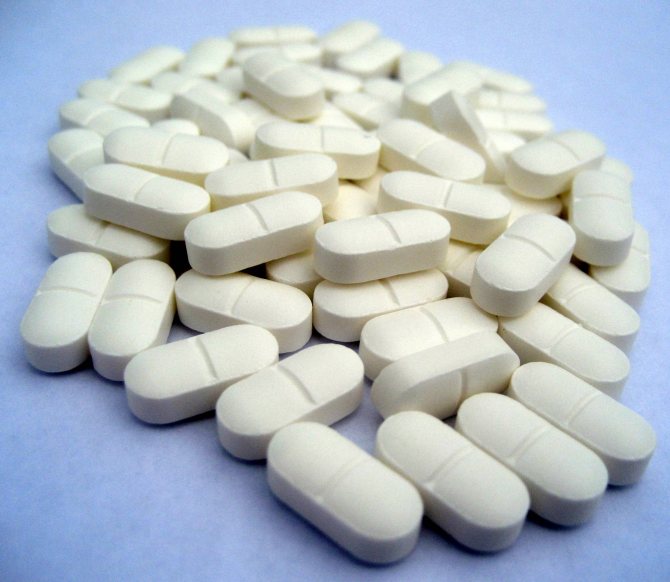
Tea to stop lactation
Traditional medicine also knows many ways to reduce milk production. Typically, this is a herbal tincture or tea that has a reducing effect on prolactin synthesis.
Diuretic herbs are often used for these purposes to remove all fluid from the body. These properties are possessed by: jasmine, basil, horsetail, belladonna vulgaris, parsley, lingonberry, etc. You can use either a separate herb or a herbal collection. The leaves of these plants need to be dried, pour boiling water over them and let it brew. Then you can take it as tea.
Sage tea has proven itself to be a good remedy for stopping the production of breast milk. First you need to prepare an infusion based on 2 tbsp. l. herbs and 1 liter of boiling water, then strain and let cool. This tea should be taken after meals, and after 3 days you will notice a positive result. Tea with sage can also strengthen the immune system and treat infertility.
Peppermint tea also helps reduce breast milk production. The mint must first be dried and crushed. Then 2-3 tbsp. l. crushed raw materials must be poured with 2 cups of boiling water. This infusion should stand for about an hour, then it should be strained and taken as tea, 0.5 cups 3 times a day. This medicine can be stored for no more than two days in the refrigerator.

Herbs that stop lactation cannot produce a positive result in one go. They need to be taken regularly, only then the milk will gradually decrease. However, even this seemingly harmless method, which reduces the amount of prolactin, can negatively affect a woman’s well-being.
How to choose the right time to stop lactation
In order to understand how to stop breast milk lactation correctly, you must first understand what stages lactation goes through from the beginning of breastfeeding to complete cessation.
Stages of breast milk production
- Preparing the mammary gland for feeding during pregnancy.
- The beginning of the lactation period is the baby's first attachment to the breast and the production of the first colostrum.
- The transitional stage is the transformation of colostrum into mature milk; during this period, “hot flashes” often occur, which are characterized by an increase in temperature and discomfort in the chest.
- Established lactation is the main period of breastfeeding, during which there may be several crises when the amount of milk decreases for a certain period of time. At this stage, the first complementary foods are introduced during breastfeeding.
- Involution of the lactation period is a reduction in the mammary gland and a gradual decrease in breast milk production.
It is the last stage that is the optimal moment to stop breastfeeding, because during this period, transferring the child to another type of food occurs most painlessly.

Signs of lactation involution:
- Constant feeling of physical fatigue after each baby's latching. The woman notes weakness, which is more likely characteristic of the postpartum period.
- Deterioration in general health. These manifestations are different for each woman. Some note dry skin and hair loss, others note problems with teeth and chronic colds. It is also possible to experience increased sensitivity of the nipples, even painful sensations, from which even breast pads do not help.
- The baby begins to suckle more actively, he literally hangs on his mother for days, which exhausts both himself and her.
- Chronologically, involution occurs no earlier than the child is fourteen months old. This is characterized by stable and complete lactation. If a woman had problems with feeding initially, then manifestations are possible at an earlier age.

What to do if milk is still produced?
Suppressing lactation with the help of special drugs is only possible if the woman is sure that she is not pregnant again. Since breastfeeding mothers often do not menstruate, many may think that it is impossible to get pregnant. This is not true, because ovulation can occur spontaneously.
Sometimes it happens that a woman decides to take pills to reduce lactation, already knowing about a new pregnancy. In such a situation, taking Dostinex is strictly prohibited. After taking this drug, doctors recommend preventing a new conception during the first month.
A woman should know that the end of lactation does not always mean a complete cessation of fluid secretion from the nipples. Sometimes it can appear periodically during the first 3 years after the last feeding and after any pregnancy (it doesn’t matter how it ended).
Spontaneous discharge of fluid from the breast may continue for the first 3-6 months after taking pills, which have a suppressive effect on milk production. If the discharge continues to appear after this time, you need to seek help from an endocrinologist. After doing all the necessary examinations, the doctor can diagnose hypothyroidism, prolactinoma or Schiehn's syndrome.
If the discharge is small, you can prevent its reappearance by wearing tight underwear. You also need to reduce stimulation of the nipples during sex or self-palpation.

The cessation of lactation is a natural process, the disruption of which can provoke the development of serious diseases. A nursing woman needs to consult with a specialist to choose the most optimal stopping method and determine drugs to suppress lactation. Self-medication in this situation is extremely dangerous.







